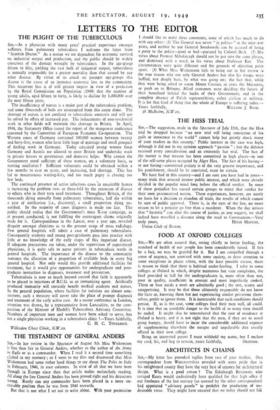THE TESTAMENT OF GENERAL ANDERS
Sot,—In her review in the Spectator of August 5th Miss Wiskemann is less than fair to General Anders, whether as the author of An Army in Exile or as a commander. When I read it a second time something clicked in my memory ; so I went to my files and discovered that Miss Wiskemann had some rather hard things to say about The Poles in Italy in February, 1946, in your columns. In view of all that we have been through in Europe since then that article makes melancholy reading. All along the line General Anders has been proved right and his detractors Wrong, Rarely can any commander have been placed in a more un- enviable position than he was from 1944 onwards.
But that is not what I set out to write abbut. With your permission
I should like to make three comments, none of which has much to do with any other: (1) The General was never " in politics" in the inter-war years, and neither he nor General Sosnkowski can be accused of being a party to the policy—good or bad—pursued by Colonel Beck. (2) His views about Premier Mikolajczyk should not be put into the same phrase, and dismissed with a word, as his views about Professor Kot. The circumstances were quite different and the grounds of objection poles apart. (3) What Miss Wiskemann fails to bring out in her review is the true reason why not only General Anders but also his troops were baffled, nay deeply hurt, by what was going on: the fact that, while they were being asked to storm Monte Cassino, or cross the Metaurus, or push on to Bologna, Allied statesmen were deciding the future of their homeland behind the backs of their Government, and in the complete absence of Polish representltives, either civilian or military. It is for that kind of thing that the whole of Europe is suffering today.—


































 Previous page
Previous page